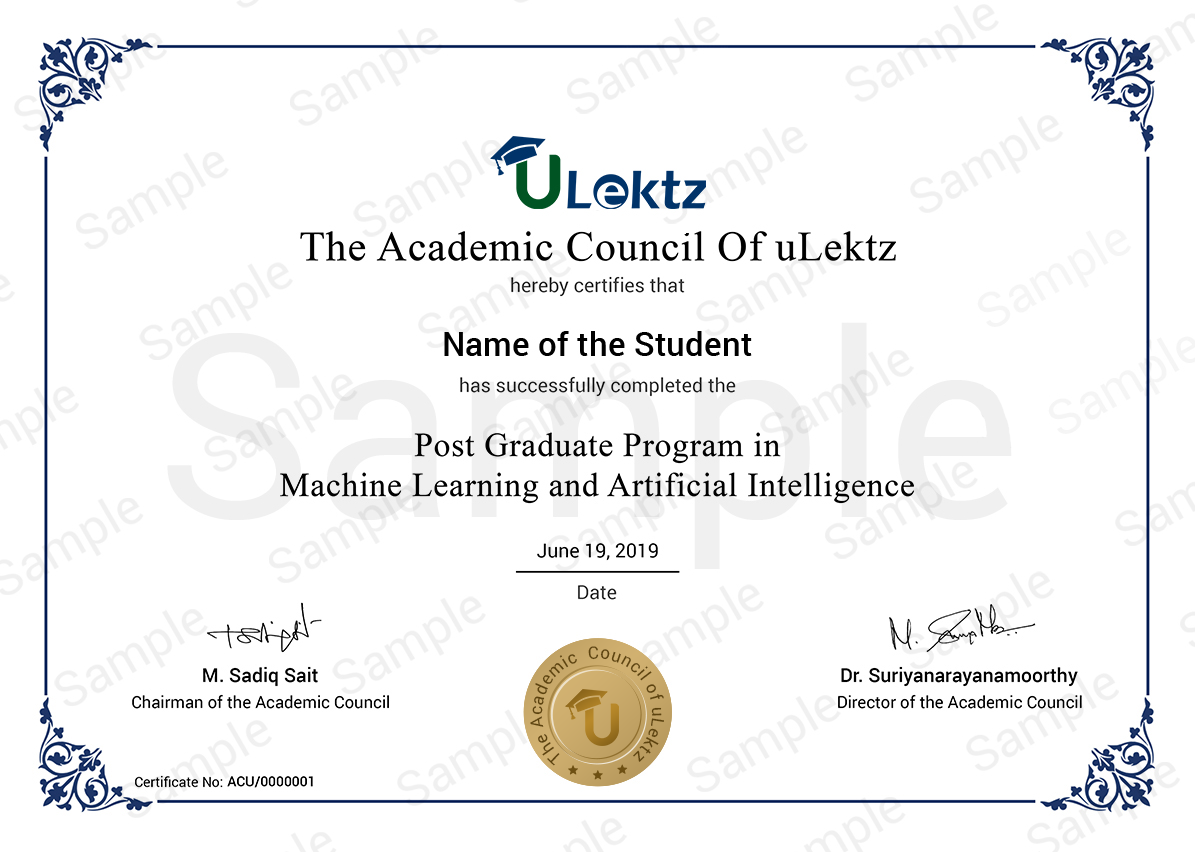

Note: Please check your Spam or Junk folder, in case you didn't receive the email with verification code.
Non-Linear: Random Order
Course Description
Data Science is the study of the generalizable extraction of knowledge from data. This course serves as an introduction to the data science principles required to tackle data-rich problems in business and academia, including: Statistical Interference, Machine Learning, Machine Learning algorithms, Classification techniques, Decision Tree, Clustering, Recommender Engines, Text Mining & Time series.
Course Objective
The Data Science course enables you to gain knowledge of the entire life cycle of Data Science, analyze and visualize different data sets, different Machine Learning Algorithms like K-Means Clustering, Decision Trees, Random Forest, and Naive Bayes.
Proctered Exams
. Pre-Learning Assessment for Adaptive Learning
15 Questions
Pre-Learning Assessment for Adaptive Learning
15 Questions
 1.1 Introduction to Data Science -Evolution of Data Science
1.1 Introduction to Data Science -Evolution of Data Science
 1.2 Business Intelligence vs Data Science - Life cycle of Data Science
1.2 Business Intelligence vs Data Science - Life cycle of Data Science
 1.3 Tools of Data Science
1.3 Tools of Data Science
 1.4 Introduction to Big Data and Hadoop
1.4 Introduction to Big Data and Hadoop
 1.5 Introduction to R
1.5 Introduction to R
 1.6 Introduction to Machine Learning
1.6 Introduction to Machine Learning
 1.7 Applications of Data Science in Various Fields
1.7 Applications of Data Science in Various Fields
 1.8 Data Security Issues
1.8 Data Security Issues
 INTRODUCTION
10 Questions
INTRODUCTION
10 Questions
 2.1 Data Collection Strategies
2.1 Data Collection Strategies
 2.2 Data Pre-Processing Overview
2.2 Data Pre-Processing Overview
 2.3 Data Cleaning
2.3 Data Cleaning
 2.4 Data Integration and Transformation
2.4 Data Integration and Transformation
 2.5 Data Reduction
2.5 Data Reduction
 2.6 Data Discretization
2.6 Data Discretization
 2.7 Model Building
2.7 Model Building
 2.8 Deployment
2.8 Deployment
 2.9 Ethics of Data Science
2.9 Ethics of Data Science
 DATA COLLECTION AND DATA PRE-PROCESSING - Assessment
10 Questions
DATA COLLECTION AND DATA PRE-PROCESSING - Assessment
10 Questions
 3.1 Statistical Inference - Terminologies of Statistics
3.1 Statistical Inference - Terminologies of Statistics
 3.2 Measures of Centers - Measures of Spread
3.2 Measures of Centers - Measures of Spread
 3.3 Probability - Normal Distribution
3.3 Probability - Normal Distribution
 3.4 Point Estimation
3.4 Point Estimation
 3.5 Confidence Intervals
3.5 Confidence Intervals
 3.6 Data Analysis Pipeline
3.6 Data Analysis Pipeline
 3.7 Hypothesis Testing - Type I and Type II Errors
3.7 Hypothesis Testing - Type I and Type II Errors
 3.8 Data Extraction - Introduction - Types of Data Raw and Processed Data
3.8 Data Extraction - Introduction - Types of Data Raw and Processed Data
 3.8 Data Extraction - Introduction - Types of Data Raw and Processed Data
3.8 Data Extraction - Introduction - Types of Data Raw and Processed Data
 3.9 Data Wrangling
3.9 Data Wrangling
 3.10 Exploratory Data Analysis - Visualization of Data
3.10 Exploratory Data Analysis - Visualization of Data
 STATISTICAL INFERENCE - Assessment
10 Questions
STATISTICAL INFERENCE - Assessment
10 Questions
 4.1 Introduction to Machine Learning
4.1 Introduction to Machine Learning
 4.2 Machine Learning Use-Cases -Machine Learning Process Flow
4.2 Machine Learning Use-Cases -Machine Learning Process Flow
 4.3 Model Evaluation and Selection
4.3 Model Evaluation and Selection
 4.4 Neural Networks and Deep Learning
4.4 Neural Networks and Deep Learning
 4.5 Natural Language Processing (NLP)
4.5 Natural Language Processing (NLP)
 MACHINE LEARNING - Assessment
10 Questions
MACHINE LEARNING - Assessment
10 Questions
 5.1 Three Basic Machine Learning Algorithms - Linear Regression
5.1 Three Basic Machine Learning Algorithms - Linear Regression
 5.2 k-Nearest Neighbors (k-NN)
5.2 k-Nearest Neighbors (k-NN)
 5.3 k-means
5.3 k-means
 5.4 Supervised Learning algorithm Logistic Regression
5.4 Supervised Learning algorithm Logistic Regression
 THREE BASIC MACHINE LEARNING ALGORITHMS - LINEAR REGRESSION - Assessment
10 Questions
THREE BASIC MACHINE LEARNING ALGORITHMS - LINEAR REGRESSION - Assessment
10 Questions
 6.1 Classification Techniques - Decision Tree - Introduction
6.1 Classification Techniques - Decision Tree - Introduction
 6.2 Algorithm for Decision Tree Induction
6.2 Algorithm for Decision Tree Induction
 6.3 Creating a Perfect Decision Tree
6.3 Creating a Perfect Decision Tree
 6.4 Confusion Matrix
6.4 Confusion Matrix
 6.5 Random Forest - Introduction
6.5 Random Forest - Introduction
 6.6 Navies Bayes
6.6 Navies Bayes
 6.7 Support Vector Machine Classification
6.7 Support Vector Machine Classification
 CLASSIFICATION TECHNIQUES -DECISION TREE - Assessment
10 Questions
CLASSIFICATION TECHNIQUES -DECISION TREE - Assessment
10 Questions
 7.1 Unsupervised Learning - Clustering & its use cases
7.1 Unsupervised Learning - Clustering & its use cases
 7.2 K-means Clustering
7.2 K-means Clustering
 7.3 C-means Clustering
7.3 C-means Clustering
 7.4 Canopy Clustering
7.4 Canopy Clustering
 7.5 Hierarchical Clustering
7.5 Hierarchical Clustering
 7.6 Density-Based Clustering: DBSCAN
7.6 Density-Based Clustering: DBSCAN
 7.7 Model-Based Clustering: Gaussian Mixture Models (GMM)
7.7 Model-Based Clustering: Gaussian Mixture Models (GMM)
 7.8 Cluster Evaluation and Validation
7.8 Cluster Evaluation and Validation
 7.9 Use Cases of Clustering
7.9 Use Cases of Clustering
 7.10 Limitations and Challenges of Clustering
7.10 Limitations and Challenges of Clustering
 UNSUPERVISED LEARNING - CLUSTERING & ITS USE CASES - Assessment
10 Questions
UNSUPERVISED LEARNING - CLUSTERING & ITS USE CASES - Assessment
10 Questions
 8.1 Recommender Engines
8.1 Recommender Engines
 8.2 Types of Recommendations
8.2 Types of Recommendations
 8.3 User-Based Recommendation
8.3 User-Based Recommendation
 8.4 Item-Based Recommendation
8.4 Item-Based Recommendation
 8.5 Difference User-Based and Item-Based Recommendation -Recommendation use cases
8.5 Difference User-Based and Item-Based Recommendation -Recommendation use cases
 8.6 Recommender Systems in Practice
8.6 Recommender Systems in Practice
 8.7 Collaborative Filtering
8.7 Collaborative Filtering
 8.8 Content-Based Filtering
8.8 Content-Based Filtering
 8.9 Evaluation Metrics for Recommender Systems
8.9 Evaluation Metrics for Recommender Systems
 8.10 Recommender Systems in Practice
8.10 Recommender Systems in Practice
 RECOMMENDER ENGINES - Assessment
10 Questions
RECOMMENDER ENGINES - Assessment
10 Questions
 9.1Text Mining - Concepts of Text-mining - Use cases
9.1Text Mining - Concepts of Text-mining - Use cases
 9.2 Text Mining Algorithms -Quantifying text - TF-IDF- Beyond TF-IDF
9.2 Text Mining Algorithms -Quantifying text - TF-IDF- Beyond TF-IDF
 9.3 Named Entity Recognition (NER)
9.3 Named Entity Recognition (NER)
 9.4 Text Classification and Text Clustering
9.4 Text Classification and Text Clustering
 9.5 Ethical Considerations in Text Mining
9.5 Ethical Considerations in Text Mining
 TEXT MINING - CONCEPTS OF TEXT-MINING - USE CASES - Assessment
10 Questions
TEXT MINING - CONCEPTS OF TEXT-MINING - USE CASES - Assessment
10 Questions
 10.1 Time Series - Time Series data
10.1 Time Series - Time Series data
 10.2 Different components of Time Series data
10.2 Different components of Time Series data
 10.3 Visualize the data to identify Time Series Components
10.3 Visualize the data to identify Time Series Components
 10.4 Implement ARIMA model for forecasting
10.4 Implement ARIMA model for forecasting
 10.5 Exponential Smoothing Models
10.5 Exponential Smoothing Models
 10.6 Seasonal and Time Series Decomposition
10.6 Seasonal and Time Series Decomposition
 10.7 Advanced Time Series Techniques
10.7 Advanced Time Series Techniques
 10.8 Long Short-Term Memory (LSTM) Networks for Time Series
10.8 Long Short-Term Memory (LSTM) Networks for Time Series
 10.9 Time Series Data for Machine Learning
10.9 Time Series Data for Machine Learning
 10.10 Case Study: Forecasting Time Series with ARIMA
10.10 Case Study: Forecasting Time Series with ARIMA
 TIME SERIES - TIME SERIES DATA - Assessment
10 Questions
TIME SERIES - TIME SERIES DATA - Assessment
10 Questions
 Final Assessment
20 Questions
Final Assessment
20 Questions
The certificate issued for the Course will have
Only the e-certificate will be made available. No Hard copies. The certificates issued by The Academic Council of uLektz. can be e-verifiable at www.ulektzskills.com/verify.



 40 hours Learning Content
40 hours Learning Content 100% online Courses
100% online Courses English Language
English Language Certifications
Certifications